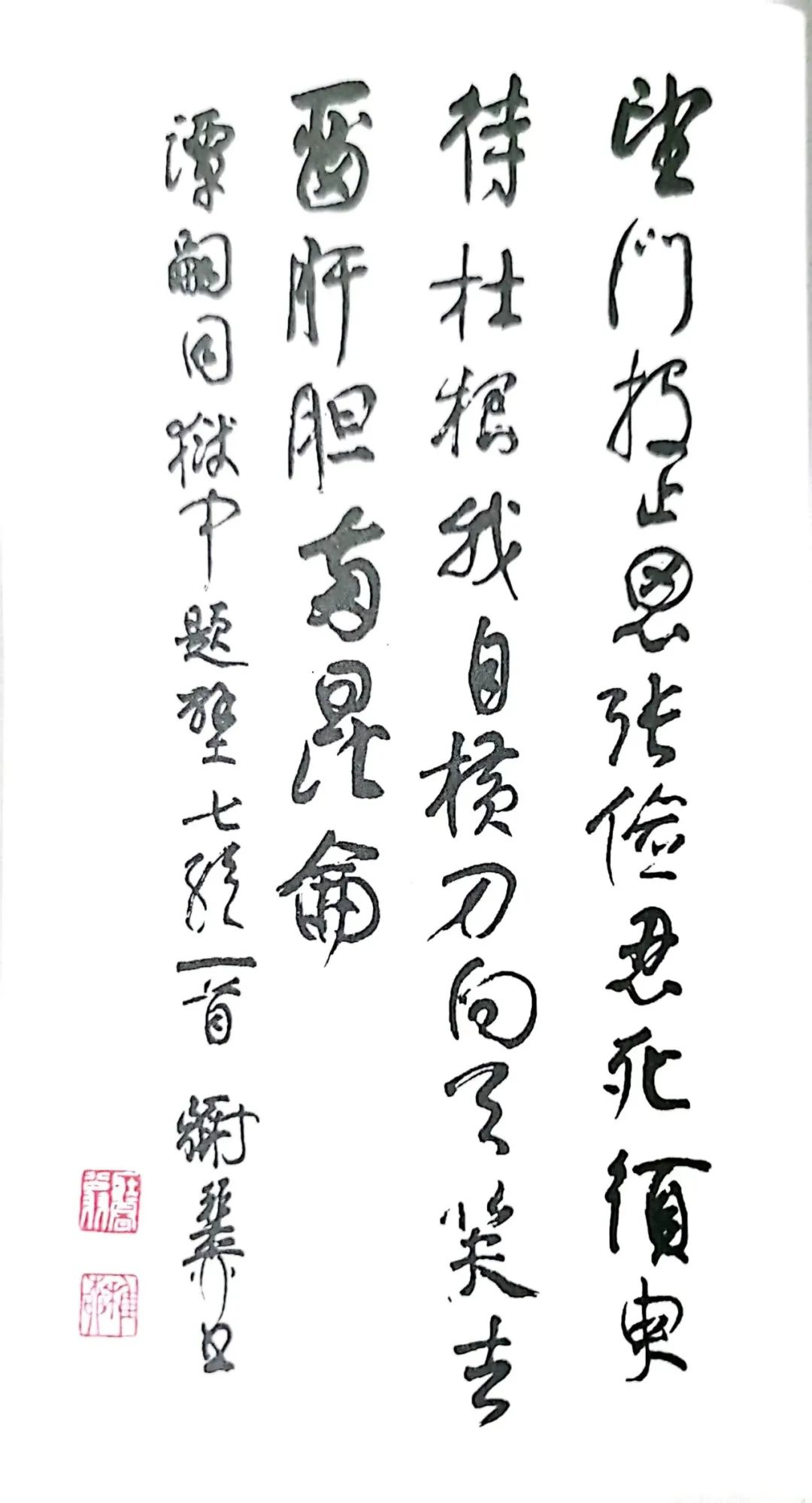编者按:2021年,为实现党建联动区域化、促进党史教育机制化,上海外国语大学与上海龙华烈士陵园举办签约共建仪式,开展建党百年、百+共建专题活动,引导广大青年在学思践悟中传颂先辈故事、坚定理想信念。上外英院龙陵青年志愿服务队从译介角度进行实践。继人物篇和文物篇后,“龙陵x英华青年说”现推出第三季故事篇,继续讲演中国共产党人的革命故事,积极推广文化译介新理念,助力红色文化“走出去”。

图为谭嗣同《狱中题壁》,谢稚柳书
(摘自《龙华碑苑诗文赏析》)
朗诵者:2020级本科生阮桢如
狱中题壁
谭嗣同
望门投止思张俭,忍死须臾待杜根。
我自横刀向天笑,去留肝胆两昆仑。
Poem on Prison Wall
Tan Sitong
The righteous Zhang was sheltered from the persecution,
The tenacious Du endured great pain before achieving his goal.
Even with the cruel knife on my neck, I would have a good laugh facing the sky.
Leaving or staying, we will all be as fearless as the grand Kunlun Mountain.
【作者简介】
谭嗣同(1865~1898),中国近代改良主义的政治家、思想家。他提倡新学,主张维新,富有爱国精神。1898年参加康有为、梁启超领导的戊戌变法,变法失败后,他临危不惧,慷慨就义,是著名的戊戌六君子之一。
[The Author]
Tan Sitong (1865-1898) is a patriotic reformist, statesman, and thinker in the late Qing Dynasty. He advocated advanced knowledge introduced from Western countries and called for reform movements in China. In 1898, he participated in the Hundred Days' Reform, led by two other patriotic pioneers, Kang Youwei and Liang Qichao. However, he was executed after the movement went abortive. He showed admirable bravery at the end of his life and is revered as one of the “Six Gentlemen” of the Reform.
【注释】
1、张俭——东汉人,任山阳东部督邮时,因弹劾宦官侯览贪赃枉法,遭其诬陷,被迫逃亡。时人敬仰张俭为人正直,皆愿为其隐匿,虽毁家灭族也所不顾。后人用“望门投止”来指这件事。
[NOTES]
1. 张俭 (Zhang Jian): an Eastern Han dynasty official. When Zhang served as governor of eastern Shanyang, he impeached eunuch Hou Lan for corruption and bribery. He was later framed by Hou and was forced to leave his place. Fortunately, the ordinary people admired Zhang's integrity and helped him hide from the persecution, even at the price of their lives. This story is known today as “望门投止 (wang men tou zhi)”.
2、杜根——东汉人,安帝时为郎中,因上书要求邓太后归政与安帝,触怒太后,被太后施以装进口袋,在殿上摔死的极刑。执刑人敬重杜根的人品,留他活命,他逃出后隐藏于酒肆,待邓太后死后复出任侍御史。
2. 杜根 (Du Gen): an Eastern Han dynasty official during Emperor An's reign. Du submitted a statement to urge empress dowager Hexi to return the actual ruling power to Emperor An. But his act enraged the empress dowager, who ordered that Du be executed cruelly: put into a sack, shaken and thrown to his death. However, the executioner respected Du's character and helped him escape. Du hid in a tavern for years and returned to serve his nation again after the death of the empress dowager.
3、肝胆——喻意为真诚,如肝胆照人,《史记• 淮阴列传》:“臣愿披腹心,输肝胆,效愚计。”
3. 肝胆 (gandan, literally meaning “liver and gall”): a metaphor referring to one's candid uprightness. It was first used in Records of the Historian: The Biography of the Marquis of Huaiyin.
4、昆仑——意为大貌。司马光曰:“昆仑者,天象之大也。”
4. 昆仑(kunlun): Kunlun Mountain is a vast mountain range in Chinese mythology. It is usually used to refer to the vast universe.
【赏析】
我自横刀向天笑
诗的前二句,表达了谭嗣同对在戊戌变法失败后逃亡在外的康有为、梁启超等同志的思念,他们正处在险恶、艰苦的环境中,希望他们能得到人们的帮助,度过险情;同时也对他们寄予了无限的期望,希望他们能等待时机,东山再起,以实现他们共同的理想。这里他运用了两个典故——东汉人张俭和杜根,贴切地表达他的这种心情。
[Analysis]
The first two lines of this poem shows that Tan misses his fellow patriots, including Kang Youwei and Liang Qichao, who were in harsh exile after the 1898 Reform failed.
The poet wished that someone would help them to weather the storm. Also, Tan fervently hoped that they patiently waited for another chance to carry forward their unfulfilled cause and eventually realize their shared aspiration. Tan quoted the stories of two righteous patriots who were treated with similar injustice in the Eastern Han dynasty: Zhang Jian and Du Gen.
后两句,写出了他的英雄气概:“我自横刀向天笑,去留肝胆两昆仑。”面对死亡,他仰天大笑,这是何等的大无畏精神。戊戌变法失败后,他本是有时间出逃的,朋友们都劝他出去避一避,但他却下定决心以身殉难,但同时他也希望能保留一批同志,以图将来,所以他劝梁启超出逃,他说:“不有行者,无以图将来;不有死者,不以召后人!”就是说无论是去者还是留者,都是为着共同的事业,都是赤胆忠心的大英雄,所以说“去留肝胆两昆仑”,“去”的指康有为、梁启超等人,“留”的指谭嗣同等戊戌六君子及其他死难者,他们各得其所,一样的崇高,一样的伟大。
The latter two lines demonstrates Tan's heroic bravery: “Even with the cruel knife on my neck, I would have a good laugh facing the sky. Leaving or staying, we will all be as fearless as the grand Kunlun Mountain.” How courageous of him! Tan's friends tried to talk him into escaping for his life after the Reform failed, and he had the time to do so, but he had made up his mind to die for the cause he believed in. At the same time, he told Liang Qichao to run away and hide for the moment, saying, “Some of us shall live so that we can advance the reform one day, but some of us shall die so that we inspire future generations of patriots!”
So, in the poem, the “leaving” refers to Kang Youwei, Liang Qichao, and all the others who ran away to protect the revolutionary force, and the “staying” refers to Tan himself, among the other members of the “Six Gentlemen”, as well as the other revolutionaries who shown remarkable bravery in the face of death. They seemed to have made different choices, but they were all striving for the same goal. They all are faithful, devoted heroes of our nation.
跋文:《谭嗣同狱中题壁》七绝一首,谢稚柳书。
Poem on Prison Wall. Seven-character poem by Tan Sitong. Cursive calligraphy by Xie Zhiliu.
谢稚柳(1910~1998),江苏常州人。原中国美协理事、上海书协主席。此篇书体为行草。
Xie Zhiliu (1910-1998) was born in Changzhou, Jiangsu Province. Xie is the former director of the China Artists Association and the chairman of Shanghai Calligrapher's Association.
我要评论 (网友评论仅供其表达个人看法,并不表明本站同意其观点或证实其描述)
全部评论 ( 条)